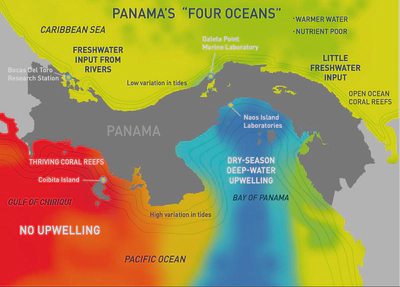The Isthmus of Panama for the study of microbial symbiosis: What can we learn from comparative analysis of host-associated microbiomes across two oceans?
December 2–7 2019
Smithsonian Tropical Research Institute
Panama City & Bocas del Toro, Panama
Organized by Matthieu Leray & Laetitia GE Wilkins

Download the Workshop Agenda Workshop Abstracts
A publication entitled Natural experiments and long-term monitoring are critical to understand and predict marine host–microbe ecology and evolution (PLoS Biology 2019) resulted from the workshop.
Background
This workshop aims to summarize the remarkable opportunities that the Isthmus of Panama presents for understanding the evolution of microbial symbiosis in the sea. Marine organisms and their microbial symbionts that were once able to move freely in a nutrient-rich sea gradually became physically isolated when the Isthmus formed and finally closed ~3 million years ago. The land mass progressively blocked oceanic currents causing the Caribbean to become oligotrophic while the Eastern Pacific remained rich in nutrients. Animal hosts and their associated microbiome followed separate evolutionary trajectories and adapted to contrasting environments. Today’s Caribbean and Eastern Pacific marine ecosystems of Panama and Central America are home to hundreds of sister species from all major taxonomic groups that emerged through transisthmian vicariance. Much of the marine research at STRI in the last 50 years has taken advantage of these parallel events of divergence (replicated evolution) to understand evolutionary mechanisms, behaviors and physiological processes that drive reproductive isolation and adaptation in marine animals.